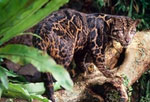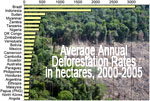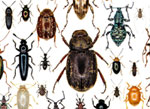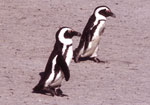FEATURED ARTICLES
An Interview with Peter Raven, director of the Missouri Botanical Garden:
Biodiversity extinction crisis looms says renowned biologist

|
|
(03/12/2007) While there is considerable debate over the scale at which biodiversity extinction is occurring, there is little doubt we are presently in an age where species loss is well above the established biological norm. Extinction has certainly occurred in the past, and in fact, it is the fate of all species, but today the rate appears to be at least 100 times the background rate of one species per million per year and may be headed towards a magnitude thousands of times greater. Few people know more about extinction than Dr. Peter Raven, director of the Missouri Botanical Garden. He is the author of hundreds of scientific papers and books, and has an encyclopedic list of achievements and accolades from a lifetime of biological research. These make him one of the world's preeminent biodiversity experts. He is also extremely worried about the present biodiversity crisis, one that has been termed the sixth great extinction.
[
Featured | Biodiversity | Interviews]
World's only blue lizard heads toward extinction

|
|
(03/08/2007) High above the forest floor on the remote Colombian island of Gorgona lives a lizard with brilliant blue skin, rivaling the color of the sky. Anolis gorgonae, or the blue anole, is a species so elusive and rare, that scientists have been unable to give even an estimate of its population. Due to the lizard's isolated habitat and reclusive habits, researchers know little about the blue anole, except that it is highly threatened by habitat loss and over-collection.
[
Featured | Biodiversity | Colombia]
Madagascar needs relief help after deadly cyclones
(03/30/2007) A deadly cyclone has struck one of the most biologically diverse parts of the planet, forcing people from their homes and damaging their only source of livelihood. Cyclone Indlala has displaced more than 100,000 people and caused widespread crop losses in northeastern Madagascar according to reports from relief organizations. 100-mph (165 km/h) winds and heavy rains caused considerable damage in coastal areas in the northeastern part of the Indian Ocean island. Relief groups working in the area, MedAir and CARE are calling for urgent assistance. The Malagasy government has asked for $242 million in assistance; the U.S. has sent $100,000.
[
Madagascar]
Extinction, like climate change, is complicated

|
|
(03/27/2007) Extinction is a hotly debated, but poorly understood topic in science. The same goes for climate change. When scientists try to forecast the impact of global change on future biodiversity levels, the results are contentious, to say the least. While some argue that species have managed to survive worse climate change in the past and that current threats to biodiversity are overstated, many biologists say the impacts of climate change and resulting shifts in rainfall, temperature, sea levels, ecosystem composition, and food availability will have significant effects on global species richness.
[
Featured | Biodiversity | Extinction]
Amazon rainforest fires date back thousands of years
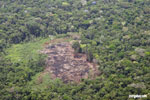
|
|
(03/15/2007) Fires are nothing new to the Amazon reports a study published in the journal Biotropica. Analyzing soils in the eastern Amazon, a team of scientists led by David S. Hammond of NWFS Consulting, has found evidence of forest fires dating back thousands of years. While the origin of these fires is unclear, the authors propose intriguing scenarios involving pre-Colombian human populations and ancient el Nino events which could have so dried rainforest areas that they became more prone to forest fires.
[
Amazon | Indigenous People]
Ecuadorian brothers show conservation-based microentrepreneurship possible

|
|
(03/07/2007) Tropical rainforests are declining across most of the world. Since the close of the 1990s deforestation rates have only accelerated as growing levels of consumption and consistent population growth paint an increasingly bleak future for the world's forests and their resident biodiversity. These trends make it easy to lose hope. As such, stories that show local people earning a livelihood from biodiversity conservation are an inspiration. Returning from his educational workshop in Ecuador, Dr. David Pearson, a research professor at the School of Life Sciences at Arizona State University, offers a hopeful example of two Ecuadorian campesinos who prove sustainable entrepreneurship is not only possible, but profitable.
[
Happy-Upbeat Environmental | Sustainable Development]
Pre-Colombian Amazon rainforest not heavily populated
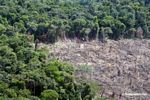
|
|
(03/07/2007) Much of the Amazon rainforest was not heavily populated by pre-Colombian indigenous cultures argues a new paper published in the journal Philosophical Transactions of the Royal Society B: Biological Sciences. The work challenges an increasingly accepted theory -- popularized in Charles C. Mann's 1491: New Revelations of the Americas Before Columbus -- that the Amazon supported dense, sedentary populations prior to the arrival of Europeans.
[
Amazon | Indigenous People]
Panama Canal port projects threaten mangroves

|
|
(03/06/2007) Port development and land speculation in Panama is turning some of the Caribbean's most productive mangrove forests into landfill. The landfill would be used for container storage near the city of Colon, at the mouth of the Panama Canal. But local scientists say the transformation could have unintended environmental consequences.
[
Panama | Deforestation | Featured]
Australia puts $200M toward rainforest conservation
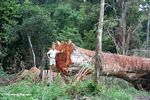
|
|
(03/30/2007) Australia has committed A$200m ($160m) to global forest conservation efforts to help fight illegal logging and slow global warming. The fund is one of the largest ever established by a government for reducing tropical deforestation. The new fund, known as the Global Initiative on Forests and Climate, aims to cut deforestation rates and promote reforestation schemes. The Australian government said the fund will primarily target developing countries where forest loss is the worst, like Indonesia and Papua New Guinea.
[
Australia | Deforestation]
Brazil to give Amazonian tribes Internet access to fight deforestation

|
|
(03/30/2007) Brazil will offer free satellite Internet connections to indigenous tribes in the Amazon according to a report from Reuters. It says that the plan will help reduce illegal logging by enabling natives to monitor and report on illicit activities. The plan comes as indigenous groups in Brazil are increasingly using the Internet and other technologies to protect their homeland.
[
Brazil | Indigenous People]
U.S. can cut oil imports to zero by 2040, oil use to zero by 2050

|
|
(03/29/2007) The United States could dramatically cut oil usage over the next 20-30 years at low to no net cost, said Amory B. Lovins, cofounder and CEO of the Colorado-based Rocky Mountain Institute, speaking at Stanford University Wednesday night for a week-long evening series of lectures sponsored by Mineral Acquisition Partners, Inc. Lovins said that investing $180 billion over the next decade to eliminate oil dependence and revitalize strategic industries can save $130 billion gross, or $70 billion net, every year by 2025 (assuming oil is $26 per barrel, higher oil prices mean higher savings). At the same time, the efforts would make American industry more competitive, improve national security, cut carbon dioxide emissions by 26 percent, and save a million transportation jobs now at risk, while creating one million net new jobs. Under the blueprint, by 2015 the U.S. could eliminate its imports from the Persian Gulf; by 2040, oil imports could vanish all together; and by 2050, the U.S. economy could be oil-free.
[
Energy | United States]
Some corals may survive acidification caused by rising CO2 levels

|
|
(03/29/2007) Several studies have shown that increased atmospheric carbon dioxide levels are acidifying the world's oceans. This is significant for coral reefs because acidification strips carbonate ions from seawater, making it more difficult for corals to build the calcium carbonate skeletons that serve as their structural basis. Research has shown that many species of coral, as well as other marine microorganisms, fare quite poorly under the increasingly acidic conditions forecast by some models. However, the news may not be bad for all types of corals. A study published in the March 30 issue of the journal Science, suggests that some corals may weather acidification better than others.
[
Coral Reefs | Oceans]
Overfishing of sharks causing shellfish decline

|
|
(03/29/2007) Overfishing of large sharks is reducing the abundance of shellfish reports a study published in the March 30 issue of the journal Science. A team of Canadian and American biologists has found that population declines in large predatory shark species -- including bull, great white, dusky, and hammerhead sharks -- due to overfishing has led to a boom in their ray, skate, and small shark prey species along the Atlantic Coast of the United States. Now these smaller species are depleting commercially important shellfish.
[
Sharks | Oceans]
Non-CO2 gases also cause global warming
(03/29/2007) While most of the focus in developing a policy to fight global warming has been on carbon dioxide, other gases also contribute to climate change. The effect of these gases is still poorly understood and should be the subject of further research say two climate scientists writing in the March 30 issue of the journal Science.
[
Carbon Dioxide | Climate Change]
CO2 levels tightly linked with climate change over past 420 million years

|
|
(03/28/2007) New research shows that sensitivity of Earth's climate to changes in the greenhouse gas carbon dioxide (CO2) have been relatively consistence for at least 420 million years, suggesting that presently rising levels of carbon dioxide resulting from fossil fuel use will indeed produce higher temperatures in the future.
[
Carbon Dioxide | Climate Change]
Dinosaur extinction didn't produce current mammal evolution

|
|
(03/28/2007) A new Nature study argues that the demise of dinosaurs did not fuel the rise of mammals. Devising a new tree of life for 4,500 species of mammals using molecular evolutionary trees, an international team of researchers challenges the prevailing hypothesis that a mass extinction of dinosaurs 65 million years ago played a major role in the diversification of mammals.
[
Dinosaurs]
Littering with new plastic might not harm dolphins, sea turtles

|
|
(03/28/2007) A new environmentally friendly plastic that degrades in seawater may make it possible to toss plastic waste overboard without killing turtles, dolphins and other marine life, according to research presented at the 233rd national meeting of the American Chemical Society by scientists from the University of Southern Mississippi.
[
Happy-Upbeat Environmental | Oceans]
U.S. government seeks to weaken Endangered Species Act
(03/28/2007) The Bush Administration is seeking to rewrite the Endangered Species Act to significantly reduce its effectiveness in protecting threatened species say environmentalists who released secret U.S. government documents on the issue.
[
Climate Change | Sea Levels]
Hundreds of millions at risk from rising sea levels
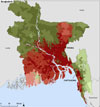
|
|
(03/27/2007) Hundreds of millions are at risk from cyclones and rising seas resulting from climate change reports a new study by researchers from the International Institute for Environment and Development (IIED) in the UK, the City University of New York, and Columbia University. The research shows that nearly two-thirds of cities with more than 5 million inhabitants lie at least partially within just ten meters above sea level. In total, about 634 million people live in within this risk zone.
[
Climate Change | Sea Levels]
Monster cane toad captured in Australia

|
|
(03/27/2007) A conservation group captured a giant cane toad in the Australian city of Darwin. The beast weighed 840 grams (1.8 pounds) and measured 20.5 cm (8 inches). The toad was captured as part of a publicity-seeking round up of the amphibian which is considered a problematic invasive species in Australia. The poisonous toad has wreaked ecological havoc on native species and killed pets and livestock.
[
Australia | Invasive Species]
Logging reduces abundance of rare mammals in Borneo
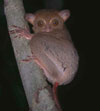
|
|
(03/27/2007) Selective logging profoundly reduces the abundance of rare forest species according to surveys of logged and unlogged rainforests on the island of Borneo, one of the most biodiverse parts of southeast Asia. The results, published in a trio of papers, have implications for biodiversity and forest conservation efforts in one of the world's most threatened ecosystems.
[
Borneo | Logging]
Endangered ebony langur doing well at Bronx Zoo
(03/27/2007) A highly endangered, three-month-old ebony langur (scientific name: Trachypithecus auratus) is thriving at the Bronx Zoo in New York City. The Wildlife Conservation Society (WCS) reports that the langur (born on Nov 25, 2006) is starting to explore its Asian rain forest habitat at the Bronx Zoo's JungleWorld. Also known as the Javan Lutung, the ebony langur is an arboreal primate found exclusively in the rainforests of Indonesia. This species is listed as "Endangered" by the World Conservation Union (IUCN) due to hunting and habitat loss.
[
Happy-Upbeat Environmental]
Malaysia to use certification to crack down on illegal logging
(03/27/2007) Malaysia will ask its timber suppliers in other countries to provide certification on the origin of wood according to a report from the International Tropical Timber Organization (ITTO). The move will help Malaysia fight allegations that its timber processors are complicit in the illegal logging industry.
[
Malaysia | Logging]
Climate change will cause biomes to shift and disappear

|
|
(03/26/2007) Many of the world's local climates could be radically changed if global warming trends continue, reports a new study published in the early online edition of the journal Proceedings of the National Academy of Sciences. The authors warn that current climates may shift and disappear, increasing the risk of biodiversity extinction and other ecological changes.
[
Climate Change | Biodiversity]
Sachs says biodiversity extinction crisis avoidable
(03/26/2007) In a Guardian Unlimited editorial published Wednesday, Jeffrey Sachs called for action to stem mounting losses of global biodiversity. Sachs, director of the Earth Institute at Columbia University and Special Advisor to United Nations Secretary-General Ban Ki-Moon, says humans are the primary cause for depletion of the world's biological richness.
[
Extinction | Biodiversity]
Plug-in cars could help fuel Austin power grid
(03/26/2007) The city of Austin, Texas hopes to launch an ambitious plan using plug-in electric cars to reduce pollution and improve power grid management, reports an article in today's Wall Street Journal. Under the initiative put forth by Roger Duncan, deputy manager of Austin Energy, the city-owned electric utility, and backed by mayor Will Wynn, the plug-in electric cars would serve as sort of giant battery from which the city grid could draw power during peak demand.
[
Energy | United States]
Cell phone batteries could be powered by OJ
(03/26/2007) Researchers at Saint Louis University in Missouri have developed a fuel cell battery that can run on virtually any sugar source -- from orange juice to tree sap -- and may last three to four times longer than conventional lithium ion batteries.
[
Energy | Biofuels]
Cargill busted in the Amazon rainforest
(03/26/2007) Brazilian authorities have shut down Cargill Incorporated's deepwater soy export terminal on the Amazon River reports the Associated Press. The action comes after a local judge ruled that the firm failed to prepare a proper environmental impact statement for the project.
[
Amazon | Agriculture]
Indonesia is 3rd largest greenhouse gas producer due to deforestation
(03/26/2007) Indonesia trails only the United States and China in greenhouse gas emissions, reports a study released Friday by the World Bank and the British government.
[
Indonesia | Carbon Dioxide]
Controversial rainforest clearing approved in Uganda
(03/26/2007) Uganda's prime minister Apolo Nsibambi has approved a plan to clear thousands of hectares of protected rainforest for a sugarcane plantation, reported the New Vision newspaper, a government-owned publication.
[
Africa | Uganda]
Ladybugs ruin good wine
(03/26/2007) Secretions by ladybugs can taint the aroma and flavor of otherwise perfectly good wine, but scientists at Iowa State University say they may have devised a solution.
[
Environment | Agriculture]
Salamanders dying due to common pesticide
(03/25/2007) Atrazine, one of the most widely used pesticides in the United States, may be killing salamanders, according to American biologists writing in the journal Environmental Health Perspectives. The researchers say while the impacts of atrazine may not show up in short-term studies, there should be concerns about its long-term effects.
[
Amphibians | Pollution]
Congo rainforest was dry savanna 25,000 years ago
(03/25/2007) Scientists from the Netherlands Organization for Scientific Research and University of Bremen in Germany have created the first detailed temperature record for tropical central Africa over the past 25,000 years. Their results confirm the thought that the Congo basin has been considerably drier than it is today.
[
Congo | Rainforests]
Too many nutrients reduce biodiversity
(03/25/2007) Too many nutrients can reduce the biodiversity of an ecosystem according to a grassland experiment conducted by University of Minnesota researchers. The research is consistent with findings in other parts of the world that suggest high nutrient abundance can increase the productivity of a few species, but limited overall species richness.
[
Biodiversity | Pollution]
Sudanese activist to discuss deadly attacks tied to dam project
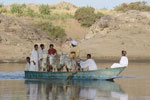
|
|
(03/24/2007) A new dam on the Nile River will displace more than 50,000 people and inundate historical sites in Sudan, reports International Rivers Network (IRN), a Berkeley-based environmental group. IRN says that once completed, the $1.8 billion Merowe Dam could worsen already poor health conditions in the area and cause significant environmental impacts.
[
Sudan | Africa]
Invasive species is pestering Europe's rich
(03/24/2007) An invasive species is causing mounting concern among rich Europeans according to an article in today's edition of The Wall Street Journal. Rhynchophorus ferrugineus, a palm weevil native to southeast Asia, is decimating ornamental palms across the Mediterranean, reportedly killing more than 10,000 in Spain.
[
Invasive Species]
Mongabay.com problems
(03/23/2007) After some major technical difficulties, mongabay.com and wildmadagascar.org are back up. Thanks for your patience. Some of the articles I was planning to run this week will be pushed to next. Rhett
Britain invests $100M to protect Congo rainforest

|
|
(03/23/2007) Britain will invest nearly $100 million (£50m) in a initiative to protect the Congo rainforest, the second largest tropical forest in the world. Ten other countries are also supporting the project. Chancellor Gordon Brown said the funding will help fight deforestation while improving the livelihood for about 50 million people in Central Africa.
[
Congo | Happy-Upbeat Environmental]
One of world's tiniest owls found in Peru
(03/23/2007) One of the world's smallest owls was spotted for the first time in the wild by researchers monitoring the Area de Conservacion Privada de Abra Patricia -- Alto Nieva, a private conservation area in northern Peru, South America. Biologists consider the Long-whiskered Owlet (Xenoglaux loweryi) "a holy grail of South American ornithology."
[
Birds | Species Discovery]
China may top U.S. in greenhouse gas emissions in 2007
(03/23/2007) China's carbon dioxide emissions may exceed those of the United States in 2007, making the country the world's largest greenhouse gas polluter, according to analysis of Chinese energy data.
[
China | Carbon Dioxide]
20 species of grouper fish are endangered
(03/21/2007) 20 of the world's 162 known species of grouper are threatened with extinction according to a survey by conservation groups. Grouper are popular food fish throughout the world, but due to their slow reproductive rates they are particularly vulnerable to overharvesting.
[
Oceans | Fish]
Bush administration seeks to cull Endangered Species Act
(03/21/2007) After losing a series of lawsuits to protect endangered species, the Bush administration moved to reinterpret the Endangered Species Act so that it would only apply to areas where species are at risk, not areas where they are thriving or have already disappeared.
[
Endangered Species | Politics]
Invasive predators more harmful to biodiversity than native predators
(03/20/2007) Alien predators are more harmful to prey populations than native predators, reports a study published in the current issue of the journal Proceedings of the Royal Society B: Biological Sciences. Analyzing prey response across dozens of field experiments in New Zealand, Australia, and island ecosystems, an international team of researchers led by P‰lvi Salo of the University of Turku in Finland found that alien predators have twice the impact as native predators on prey populations. Surprisingly, the research also showed that alien predators in mainland areas had a greater impact than in island environments.
[
Biodiversity]
Fruit-eating birds at particular risk from Indonesian deforestation

|
|
(03/20/2007) A new study on the island of Sulawesi in Indonesia confirms the critical importance of fig trees to the rainforest ecosystem. The research has implications for wildlife conservation in an area of high rates of forest loss from agricultural conversion and logging.
[
Birds | Deforestation | Indonesia]
Fires burn across Burma; pollution levels rise in Thailand
(03/20/2007) Fires are raging across Myanmar (Burma) causing 'haze' pollution in neighboring Thailand, Laos, and southern China according to new satellite images release by NASA. The fires are set annually during the dry season for clearing brush and scrub for agriculture. In especially dry years the fires often spread into adjacent forest areas.
[
Asia | Fires]
70% of new drugs come from Mother Nature
(03/20/2007) Around 70 percent of all new drugs introduced in the United States in the past 25 years have been derived from natural products reports a study published in the March 23 issue of the Journal of Natural Products. The findings show that despite increasingly sophisticated techniques to design medications in the lab, Mother Nature is still the best drug designer.
[
Medicinal Plants]
Big Basin pictures

|
|
(03/19/2007) Sunday morning I went hiking in Big Basin. I added some pictures to existing photos I have from the park. Big Basin Redwoods State Park is a California state park, located in Santa Cruz County about 23 miles northwest of Santa Cruz. Established in 1902, Big Basin is California's oldest State Park. The park covers 18,000 acres and is home to the largest continuous stand of Ancient Coast Redwoods south of San Francisco.
[
Big Basin]
Genetically engineered mosquitoes could help control malaria

|
|
(03/19/2007) Globally, governments are spending hundreds of millions of dollars annually to reduce the impact of the malaria, a mosquito-borne disease that affects around 400 million people each year and kills one to three million die. While most of the focus to date have been on developing drugs that boost immunity to malaria or counteract the malaria parasite once it is in the victim's bloodstream, scientists have now developed a treatment that focuses on the mosquito itself. The research, described in PNAS, uses a genetically engineered strain of malaria-resistant mosquitoes to out-compete natural mosquitoes when fed malaria-infected blood.
[
Health]
Prehistoric lizard glided through air using ribs
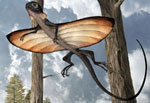
|
|
(03/19/2007) An extinct species of lizard used a wing-like membrane supported by the animal's elongated ribs for gliding through the air according to Chinese researchers. The 6-inch (15.5 cm) lizard, found in the Liaoning Province of northeastern China, lived during the Early Cretaceous period. The specimen is described in the early online edition of the journal Proceedings of the National Academy of Sciences (PNAS). .
[
Paleontology]
Poisonous tree frog brings hope to indigenous community in the Amazon

|
|
(03/19/2007) Carolina Bruun, a Brazilian writer working on a masters degree in International Journalism at City University in the UK, contributed an article based on her two months of work in the Brazilian state of Acre in the Amazon. She writes about an Amazonian tree frog that has been used for centuries for natural disease prevention and as a physical stimulant. She says the species has become a symbol of Brazil's fight to bring economic benefits to indigenous people for scientific developments based on their knowledge.
[
Ethnobotany | Indigenous People]
Greens team with timber industry on new anti-illegal logging bill
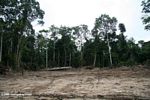
|
|
(03/16/2007) A bipartisan group of U.S. lawmakers introduced a bill to ban the use of illegally-harvested timber and wood products. Led by Congressmen Earl Blumenauer (D-OR), Robert Wexler (D-FL), and Jerry Weller (R-IL) the legislation would make it a crime to import, export, possess, purchase or sell illicit timber. Illegal logging is estimated to cost the U.S. timber industry $960 million to $1.16 billion per year in lost sales. Globally about $23 billion worth of forest products are produced from illegally harvested timber, of which $5 billion is traded internationally according to a 2005 report published by Seneca Creek Associates and Wood Resources Institute. Much of the illegal timber that reaches the United States comes from Indonesia and the Amazon rainforest.
[
Logging | Happy-Upbeat Environmental]
Global warming reduced crop yields over past 20 years
(03/16/2007) Global warming has already caused crop losses according to a new study by researchers at the Lawrence Livermore National Laboratory and the Carnegie Institution at Stanford University. The study, published March 16 in the online journal Environmental Research Letters, shows that warming temperatures have reduced the combined production of wheat, corn, and barley by 40 million metric tons per year between 1981-2002. The authors, David Lobell of Lawrence Livermore and Christopher Field of the Carnegie Institution, estimate the annual losses at $5 billion.
[
Agriculture | Climate Change]
Past winter was warmest on record
(03/16/2007) This winter was the warmest on record according to the U.S. government's National Oceanic and Atmospheric Administration (NOAA). NOAA said that winter temperature for the contiguous United States was 33.6 degrees F (0.9 degrees C), about 0.6 degrees above the 20th century average. Globally the winter was the all-time warmest since records began in 1880, about 1.30 degrees F (0.72 degrees C) above the 20th century mean.
[
United States]
Evolution is faster in temperate zones
(03/15/2007) A new study argues that temperate zones are hotbeds of evolution, not tropical areas as conventionally held. The research, published in the March 16 issue of the journal Science, says that species do not evolve faster in warmer climates. It suggests that tropical species' extinction rates are lower than those in temperate regions.
[
Biodiversity]
Melting Antarctic glaciers could trigger sea level rise
(03/15/2007) Scientists have identified four melting Antarctic glaciers that could trigger a rapid rise in global sea levels according to a study published in the journal Science.
[
Antarctica]
Earth may be near global warming tipping point
(03/15/2007) Earth could be reaching a tipping point that could trigger rapid climate change according to scientists studying declining sea ice in the Arctic.
[
Greenland-Arctic]
New clouded leopard species discovered in Borneo
(03/14/2007) Scientists have declared that the clouded leopard found on the islands of Borneo and Sumatra is an entirely new species of cat, genetically distinct from the clouded leopard that lives in mainland southeast Asia. The scientists say that the two species of clouded leopard appear to have diverged about 1.4 million years ago. They also note that the results of the genetic study are supported by separate research on geographical variation in the coat color of the clouded leopard.
[
Borneo | Species Discovery]
Clean coal is a vital energy source for the future says MIT report
(03/14/2007) Coal is a cheap and widely available energy source that will be continue to be used in the future despite its impact on global climate. For this reason, says a new report by MIT, it is essential to develop cleaner technologies for harnessing coal.
[
Energy]
Ivory-billed Woodpecker sighting may be a mistake
(03/14/2007) A new study casts doubt on the apparent rediscovery of the Ivory-billed Woodpecker in Arkansas. J. Martin Collinson, a researcher at the University of Aberdeen in Scotland, says that the sighting of the thought-to-be-extinct bird is a case of mistaken identity. Using video analysis, Collinson argues that ornithologists have confused the Ivory-billed Woodpecker (Campephilus principalis) with the similar Pileated Woodpecker (Dryocopus pileatus).
[
Birds]
World population to peak at 9.2 billion in 2050

|
|
(03/13/2007) World population is expected to reach 9.2 billion by 2050 according to a new study by the United Nations. Virtually all growth will occur in developing countries, with their population growing from 5.4 billion today to 7.9 billion mid-century. The population of developed regions is expected to remain unchanged at 1.2 billion, and would have declined, were it not for the anticipated net migration from developing to developed countries.
[
Population]
UK to cut CO2 emissions by 60%

|
|
(03/13/2007) Tony Blair pledged Wednesday to cut Britain's carbon dioxide emissions by 60 percent by 2050 in an effort to fight global warming. In announcing the Climate Change Bill, Britain becomes the first country to set legally binding targets. "With climate change we can't just close our eyes and cross our fingers," said Environment Secretary David Miliband. "We need to step up our action to tackle it, building on our considerable progress so far. And time isn't on our side."
[
Carbon Dioxide | Climate change]
New bamboo species discovered in U.S., first in 200 years
(03/13/2007) Botanists have discovered a previously unknown species of North American bamboo in the hills of Appalachia. It is the third known species of bamboo in the United States, but the first new species in more than 200 years. The species is named Arundinaria appalachiana.
[
Species Discovery | United States]
Bush administration cuts funding for geothermal energy
(03/13/2007) The Bush Administration is seeking to eliminate federal funding for geothermal energy research according to a report from Reuters. Oddly, the move comes as the White House has made a push for renewable energy to reduce dependence on foreign oil imports. Apparently the administration appears to be focused on biofuels as liquid fuels and nuclear for electricity generation.
[
Energy | Renewable energy]
Rich countries gain, poor countries lose forest cover
(03/13/2007) Tropical deforestation rates continue to accelerate according to a bi-annual report from the Food and Agriculture Organization of the United Nations (FAO) released Tuesday. But the State of the World's Forests reports that while forest loss continues in the world's poorest countries, wealthier nations are seeing increasing forest cover after centuries of deforestation. Overall 57 countries reported an increase in forest area, and 83 reported a decrease between 2000 and 2005.
[
Deforestation | Forests]
Can new loan really bring sustainable cattle ranching to the Amazon?

|
|
(03/13/2007) Brazil's second largest exporter of beef has won approval of a controversial loan from the International Finance Corporation (IFC), the private equity lender of the World Bank, according to a report from the Associated Press. Environmentalists say the deal will drive further deforestation in the biologically rich Amazon rainforest. Cattle ranching is responsible for more than half of forest loss in the region.
[
Amazon | Rainforests]
Amazon rainforest does have rainy and dry seasons
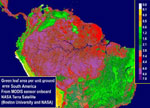
|
|
(03/13/2007) A new study using NASA satellite images found evidence of seasonality in the Amazon rainforest. The results, published in the March 20 issue of the Proceedings of the National Academy of Sciences, show that the Amazon had 25 percent more leaf coverage in the dry season and 25 percent less in the rainy season.
[
Amazon | Rainforests]
Wind energy speculation jumps in Texas, but Exxon on sidelines
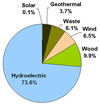
|
|
(03/12/2007) While speculative energy ventures are nothing new in Texas, today companies are taking risky gambles in wind power argues an article that appears in today's issue of The Wall Street Journal (WSJ). The WSJ reports that energy firms are investing hundreds of millions of dollars in some of the most remote -- and windy -- parts of Texas, but notes that the investments will only pay off with government subsidies.
[
Energy | Renewable Energy]
Caribbean coral reefs result of mass extinction, rise of isthmus

|
|
(03/12/2007) Extinctions that resulted from the formation of the Panamanian isthmus were delayed two million years according to a new study by researchers at the Smithsonian Tropical Research Institute, Scripps Institution of Oceanography and London's Natural History Museum. The findings may have implications for global species extinction and evolution.
[
Extinction | Oceans]
New articles in Indonesian
(03/11/2007) With the help of Indie from Jakarta, I've added Indonesian translations of my Borneo website and several other important articles.
New Snapper Species Discovered in Brazil
(03/09/2007) A new species of snapper was discovered off the coast of Brazil. The popular game fish had long been mistaken for a more common species, according to scientists with Conservation International (CI) and Environmental Defense. The description of the Lutjanus alexandrei snapper is published in the journal Zootaxa.
[
Species Discovery | Oceans]
Interview in JournalPeru [external link]
(03/09/2007) Earlier this week I did an interview with JournalPeru, an English-language Peruvian news site.
Bush administration issues gag order on polar bear talk

|
|
(03/08/2007) The Bush administration has banned discussion of polar bears, sea ice, and global warming among officials traveling overseas according to environmental groups and the director of the U.S. Fish and Wildlife Service. The policy is significant because the administration is currently considering whether to classify polar bears as "threatened" under the Endangered Species Act, a move that could require the government to take measures to protect the species.
[
Politics | United States]
Carbon dioxide levels threaten oceans regardless of global warming
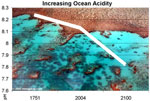
|
|
(03/08/2007) Rising levels of carbon dioxide will have wide-ranging impacts on the world's oceans regardless of climate change, reports a study published in the March 9, 2007, issue of the journal Geophysical Research Letters. The study, authored by Ken Caldeira from the Department of Global Ecology at the Carnegie Institution at Stanford University and Long Cao and Atul Jain of the University of Illinois, shows the increasing absorption of carbon dioxide is acidifying global oceans, putting sea life at risk.
[
Oceans | Climate Change]
Human hunting causes changes in monkey behavior

|
|
(03/08/2007) Human hunting pressure causes significant behavioral changes in Central Africa monkeys and duiker according to a paper published in the March issue of the journal Biotropica. The research, conducted in southwestern Gabon and led by Barbara M. Croes of the Smithsonian Institution, found that "monkeys become more secretive when hunted" and use alarm calls at shorter distances, while duiker -- small forest antelope -- abandon their usual "freeze response" and rapidly flee when confronted by humans.
[
Animal Behavior | Hunting]
Birds follow raccoon-like coati to find food

|
|
(03/08/2007) A number of rainforest bird species are known to follow columns of army ants eating insects and other animals as they try to escape the marauding ants. Now the behavior has been documented in birds that follow the coatimundi, a raccoon-like mammal, as it forages in the rainforest.
[
Animal Behavior | Birds]
New marine species discovered in Panama
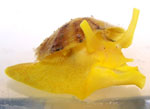
|
|
(03/08/2007) Smithsonian scientists have discovered a number of previously unknown species in an expedition off the Pacific coast of Panama. Among the organisms new to science are crustaceans, ribbon worms, soft corals, and snails. "It's hard to imagine, while snorkeling around a tropical island that's only a three-hour flight from the United States, that half the animals you see are unknown to science," said Rachel Collin, coordinator of the trip and a researcher at the Smithsonian Tropical Research Institute (STRI).
[
Species Discovery | Oceans]
Deforestation causes species extinction in Madagascar
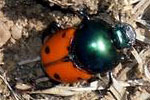
|
|
(03/07/2007) Deforestation has already caused the extinction of a large number of endemic insect species on the island of Madagascar, according to new research published in the March edition of the journal Biology Letters. The work suggests that only half the species confined to these forest areas will survive.
[
Madagascar | Extinction]
Gold mining in Guyana damages environment, threatens Amerindians
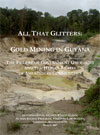
|
|
(03/07/2007) Informal gold mining is causing environmental harm and human rights abuses in Guyana says a new report from the International Human Rights Clinic (IHRC) of Harvard Law School's Human Rights Program. Wildcat gold mining has been a serious problem in the Guiana shield countries of Brazil, Venezuela, Guyana, Suriname and French Guiana. Rising gold prices in recent years have only worsened the problem, as illegal miners have flooded the region clearing forest, polluting rivers, and making threats against indigenous people.
[
Amazon | Indigenous People]
Bird species rediscovered after 139 years
(03/06/2007) A wetland bird that has been "lost" for nearly 140 years was rediscovered at a wastewater treatment plant in Thailand according to bird conservation group BirdLife International. The Large-billed Reed-warbler (Acrocephalus orinus) was spotted by ornithologist Philip Round, a biologist at Mahidol University in Bangkok. Previously the only known example of the species was collected in the Sutlej Valley of India in 1867.
[
Species Discovery | Birds]
GM plans electric car for 2010
(03/06/2007) Underperforming U.S. automaker General Motors said it has set a 2010 target for production of an-electric car according to a statement from Vice Chairman Bob Lutz, as reported by Reuters.
[
Energy]
Termites can make ethanol
(03/06/2007) Achim Steiner, Executive Director of the UN Environment Programme (UNEP), says that termites can be used to make eco-friendly ethanol. He cites U.S. government backed research showing that "microbes living in the guts of termites have potent enzymes able to efficiently and cost effectively transform woody wastes into sugars for ethanol production."
[
Cellulosic Ethanol | Biofuels]
Farming in the rainforest can preserve biodiversity, ecological services
(03/05/2007) While conversion of tropical forest for agriculture results in significant declines in biodiversity and carbon storage, an analysis of Indonesian rainforests shows that farming cacao under the partial shade of high canopy trees can provide a way to balance economic gain with environmental considerations. The paper, published online in the early edition of PNAS by Ingolf Steffan-Dewenter and colleagues, found that while income is maximized by total removal of the forest canopy, cacao farming under a partially thinned canopy maintains species diversity and reduces environmental impacts.
[
Indonesia | Agriculture]
Two new species of eyeless albino millipede found in Arizona
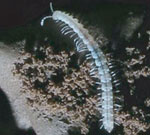
|
|
(03/05/2007) A newly discovered genus of millipede may shed light on the poorly understood cave ecosystems of the desert southwest. J. Judson Wynne, with the Department of Biological Sciences at Northern Arizona University (NAU) and cave research scientist with the U.S. Geological Survey's Southwest Biological Center, and Kyle Voyles, Arizona State Cave Coordinator for the Bureau of Land Management (BLM), collected the two previously unknown millipede species in caves on opposite sides of the Grand Canyon.
[
Species Discovery]
Ozone ban has been more effective in fighting global warming than Kyoto Protocol
(03/05/2007) The 1987 Montreal Protocol, which restricted the use of ozone-depleting substances, has helped slow the rate of global warming in addition to protecting the ozone layer, report scientists writing in a paper published online in the early edition of PNAS.
[
Ozone Layer | Climate Change]
Pollution in Asia causes stronger thunderstorms, may worsen global warming
(03/05/2007) Growing levels of pollution in Asia are altering the chemistry of the atmosphere and causing a change in Pacific storm patterns according to researchers writing in the online early edition of PNAS.
[
Pollution | Climate Change]
Birds exhibit thuggish mafia-like behavior as nest enforcers
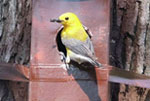
|
|
(03/05/2007) Parasitic birds engage in mafia-like reprisals to encourage host acceptance of their eggs according to researchers writing in the online early edition of PNAS. While a number of bird species, notably cuckoos, are brood parasites that lay their eggs in the nests of unsuspecting hosts, the reason as to why host birds raise chicks that are obviously not their own has not been scientifically documented. Researchers have observed the destruction of nests and eggs of hosts that reject their parasitic eggs, but until no controlled studies on the behavior had been performed.
[
Birds | Animal Behavior]
Coral species may help fight global warming impact
(03/04/2007) While many coral species appear to be potentially doomed by global warming, some species may help fight the impact of climate change, in effect helping protect coral reef ecosystems, argues a Cornell University biologist.
[
Coral Reefs | Climate Change]
U.S. GHG emissions to rise 20% by 2020
(03/03/2007) The United States expects to emit 19 percent more greenhouse gases in 2020 than it did in 2020 according to a report from the Associated Press. The draft report, which is still in progress and is more than a year late, projects 9.2 billion tons of greenhouse gas emissions in 2020, a 19 percent increase from 7.7 billion tons in 2000, if the Bush Administration climate policy proceeds as planned.
[
Pollution | Climate Change]
Environmental controversy brews over TXU deal
(03/02/2007) Initially hailed as a victory for the environment, the private equity deal to acquire Texas-energy company TXU Corp is now facing criticism from some green groups reports the Saturday issue of The Wall Street Journal.
[
Energy | Politics]
African penguin population drops 40% - cause unknown
(03/02/2007) African penguin populations have fallen by 40 percent in the past few years according to an article published in the March 2, 2006 issue of Science. Biologists are puzzled by the decline. Rob Crawford, a penguin expert with South Africa's Environmental Affairs Department, is quoted as saying the trend is "quite disturbing." He believes the drop may be due to scarcity of sardines and anchovies around penguin colonies, a development that may be the result of over fishing or larger environmental changes. The article notes that the South African government is evaluating various measures to protect penguins including "establishing no-fishing zones around several
breeding islands."
[
Birds]
Role of global warming in extinction may be overestimated
(03/01/2007) Extinction is a hotly debated, but poorly understood topic in science. The same goes for climate change. When you bring the two together to forecast the impact of global change on biodiversity, chaos reigns. While many ecologists argue that climate change could well doom many more species to extinction, others say that the threat is overstated.
[
Climate Change | Extinction]






























